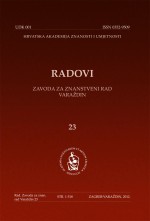UBOJSTVO PODTURENSKOG UČITELJA SLAVKA KUKOLJA 1945. GODINE
MURDER OF PODTUREN TEACHER SLAVKO KUKOLJ IN 1945
Author(s): Branimir BunjacSubject(s): History
Published by: Hrvatska akademija znanosti i umjetnosti - Zavod za znanstveni rad Varaždin
Keywords: Međimurje; Podturen; Sivica; OZN (Intelligence Agency of the Independent State of Croatia and Department of Civil Protection); Slavko Kukolj; Hajdarović; Zvonimir Panić; County court Varaždin; “crusaders“
Summary/Abstract: The author analyses the murder of teacher Slavko Kukolj in the village of Podturen in Međimurje in 1945. Till present time, this crime has not been suitably explained, including the identification of the murderer and his motives. Investigating this case, in existing descriptions of the mentioned event, the real murder Zvonimir Panić was not only granted amnesty for his crime, but was also declared a martyr of the struggle for Croatian national independence. This was possible, since until now, writers about this event followed and assessed only Panić’s tragic end at the Criminal correctional institution in Lepoglava. However, analyzing this case from different angles, the author, proves that the mentioned conclusion is completely wrong, and that real victims are members of the families Kukolj and Hajdarović. Struck particularly hard was the Hajdarović family, entirely innocent, whose persecutors were never punished for the crime they have committed. Besides the resolution of this single case, fitting it in a wider context clearly showed that in the period after the communist government takeover in Međimurje, the political authorities had a much too large influence on all institutions’ work activities as well as, in general, the lives of individuals. Since, in the beginning, the new government followed Stalin’s model of society formation, for a classic crime of self-interest, they systematically looked for political motives and justifications. Once a sequence of doubts was launched, it caused the persecution of entire families, as well as political and social consequences that even in present time still resonate. Therefore, in the conclusion, the author calls for a more objective approach in regards to World War II victims, in order to accomplish, not just, more satisfactory historical evaluations, but also stop the trauma that has been incurred from generation to generation.
Journal: Radovi Zavoda za znanstveni rad Varaždin
- Issue Year: 2012
- Issue No: 23
- Page Range: 445-468
- Page Count: 24
- Language: Croatian

